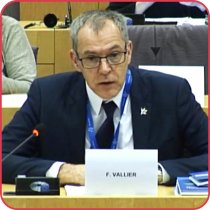Home /
News /
In-depth news /
REGI Committee
next > < previous

Cohesion policy

REGI Committee - 20.02.2020
MEPs ready to veto Council’s budget plan to protect cohesion
MEPs are prepared to reject the European Council’s proposal for Europe’s next long-term budget, on grounds that it would mean massive cuts to cohesion policy. This was made clear today at a hearing of the European Parliament’s Committee for Regional Development (REGI).
REGI Committee Chair Younous Omarjee spoke in categorical terms: “As of now there is only one message: if [European Council President] Charles Michel’s proposal does not move closer to that of the Parliament, then Parliament will reject it.”
CEMR representatives at the event were invited to present our work and positions on behalf of local governments. We exposed our activities as a knowledge hub for local and regional governments, as well as our policy positions, notably concerning the budget.
“We need to quickly find an agreement on the next multiannual financial framework, but not at any price”, said CEMR Secretary General Frédéric Vallier. “To cut cohesion policy, as drastically as have proposed the Commission and today the Council, would go against the new Commission’s ambitious objectives, notably for an environmental transition that is just for territories and people.”
As detailed in our analysis of the Just Transition Fund (JTF), the new instrument would have only limited added value insofar as it requires cofinancing from existing cohesion programmes (ERDF and ESF+), which can already be dedicated to environmental issues and retraining.
What’s more, under Council President Charles Michel’s proposal, the JTF’s €7.5 billion would not represent new funds, but would be taken from the European Agricultural Fund for Rural Development (EAFRD).
REGI MEPs also expressed their support for the Partnership Principle, under which local and regional governments must be consulted in the drafting of national cohesion spending plans. “The Partnership Principle must be at the heart of the current negotiations”, Omarjee said. “The projects eventually land in the territories themselves; municipalities must then be involved as much as possible in the funds’ implementation.”
National governments in the Council must still agree their position on the future long-term budget. Once this is done, negotiations between the Parliament and Council will begin, but a final agreement still seems months away. CEMR will work with other members of the Cohesion Alliance to ensure that the new budget is socially just and leaves no place behind.
REGI Committee Chair Younous Omarjee spoke in categorical terms: “As of now there is only one message: if [European Council President] Charles Michel’s proposal does not move closer to that of the Parliament, then Parliament will reject it.”
CEMR representatives at the event were invited to present our work and positions on behalf of local governments. We exposed our activities as a knowledge hub for local and regional governments, as well as our policy positions, notably concerning the budget.
“We need to quickly find an agreement on the next multiannual financial framework, but not at any price”, said CEMR Secretary General Frédéric Vallier. “To cut cohesion policy, as drastically as have proposed the Commission and today the Council, would go against the new Commission’s ambitious objectives, notably for an environmental transition that is just for territories and people.”
As detailed in our analysis of the Just Transition Fund (JTF), the new instrument would have only limited added value insofar as it requires cofinancing from existing cohesion programmes (ERDF and ESF+), which can already be dedicated to environmental issues and retraining.
What’s more, under Council President Charles Michel’s proposal, the JTF’s €7.5 billion would not represent new funds, but would be taken from the European Agricultural Fund for Rural Development (EAFRD).
REGI MEPs also expressed their support for the Partnership Principle, under which local and regional governments must be consulted in the drafting of national cohesion spending plans. “The Partnership Principle must be at the heart of the current negotiations”, Omarjee said. “The projects eventually land in the territories themselves; municipalities must then be involved as much as possible in the funds’ implementation.”
National governments in the Council must still agree their position on the future long-term budget. Once this is done, negotiations between the Parliament and Council will begin, but a final agreement still seems months away. CEMR will work with other members of the Cohesion Alliance to ensure that the new budget is socially just and leaves no place behind.
 shqiptar
shqiptar български
български hrvatski
hrvatski čeština
čeština dansk
dansk Nederlands
Nederlands English
English eesti keel
eesti keel suomi
suomi Français
Français საქართველოს
საქართველოს Deutsch
Deutsch ελληνικά
ελληνικά עברית
עברית íslenska
íslenska italiano
italiano Gaeilge
Gaeilge latviešu valoda
latviešu valoda lietuvių kalba
lietuvių kalba magyar
magyar македонски
македонски Malti
Malti norske
norske polski
polski português
português română
română Serbian
Serbian slovenčina
slovenčina slovenščina
slovenščina español
español Türkçe
Türkçe svenska
svenska український
український
















































